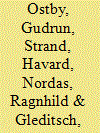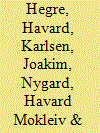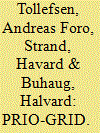|
|
|
Sort Order |
|
|
|
Items / Page
|
|
|
|
|
|
|
| Srl | Item |
| 1 |
ID:
106368


|
|
|
|
|
| Publication |
2011.
|
| Summary/Abstract |
The article by Jacob Mundy in this issue of Security Dialogue draws attention to the ongoing debate between deconstructivists and quantitative researchers. The article criticizes the current state of the 'new literature on civil wars' and offers some recommendations as to how this literature might be improved. Yet, as a scholar on the receiving end of it, I am unable to make use of Mundy's critique. I do not understand the premises for his article; I am not convinced by the case of Algeria; and I am unable to understand the recommendations made at the end of the piece. In other words, the dialogue here is not working. In large parts, this failure in communication is due to the fact that the relevant literatures very rarely connect with each other. The use of concepts in Mundy's article might represent one of the few occasions on which they do. I propose a set of recommendations that I hope might assist in rendering the dialogue between these currently estranged literatures less futile.
|
|
|
|
|
|
|
|
|
|
|
|
|
|
|
|
| 2 |
ID:
126712


|
|
|
|
|
| Publication |
2013.
|
| Summary/Abstract |
Many studies report lower academic productivity among women. But are women less likely to get their research published in the first place? The evidence for potential gender bias in publication and impact is mixed. This article examines the gender dimension of scientific publication in international relations (IR) based on submission data for Journal of Peace Research for the period 1983-2008. It examines the gender gap in submissions and explores whether the perceived merit of a research paper is affected by the gender of the authors and reviewers. It also investigates whether the gender of the first author influences citation counts. The data show a clear but declining gender gap. They do not indicate any significant gender bias in publication success or citations.
|
|
|
|
|
|
|
|
|
|
|
|
|
|
|
|
| 3 |
ID:
120869


|
|
|
|
|
| Publication |
2013.
|
| Summary/Abstract |
The article predicts changes in global and regional incidences of armed conflict for the 2010-2050 period. The predictions are based on a dynamic multinomial logit model estimation on a 1970-2009 cross-sectional data set of changes between no armed conflict, minor conflict, and major conflict. Core exogenous predictors are population size, infant mortality rates, demographic composition, education levels, oil dependence, ethnic cleavages, and neighborhood characteristics. Predictions are obtained through simulating the behavior of the conflict variable implied by the estimates from this model. We use projections for the 2011-2050 period for the predictors from the UN World Population Prospects and the International Institute for Applied Systems Analysis. We treat conflicts, recent conflict history, and neighboring conflicts as endogenous variables. Out-of-sample validation of predictions for 2007-2009 (based on estimates for the 1970-2000 period) indicates that the model predicts well, with an area under the receiver operator curve of 0.937. Using a p > .30 threshold for positive prediction, the true positive rate 7-9 years into the future is 0.79 and the False Positive Rate 0.085. We predict a continued decline in the proportion of the world's countries that have internal armed conflict, from about 15% in 2009 to 7% in 2050. The decline is particularly strong in the Western Asia and North Africa region and less clear in Africa south of Sahara. The remaining conflict countries will increasingly be concentrated in East, Central, and Southern Africa and in East and South Asia.
|
|
|
|
|
|
|
|
|
|
|
|
|
|
|
|
| 4 |
ID:
112782


|
|
|
|
|
| Publication |
2012.
|
| Summary/Abstract |
Contributions to the quantitative civil war literature increasingly rely on geo-referenced data and disaggregated research designs. While this is a welcome trend, it necessitates geographic information systems (GIS) skills and imposes new challenges for data collection and analysis. So far, solutions to these challenges differ between studies, obstructing direct comparison of findings and hampering replication and extension of earlier work. This article presents a standardized structure for storing, manipulating, and analyzing high-resolution spatial data. PRIO-GRID is a vector grid network with a resolution of 0.5 x 0.5 decimal degrees, covering all terrestrial areas of the world. Gridded data comprise inherently apolitical entities; the grid cells are fixed in time and space, they are insensitive to political boundaries and developments, and they are completely exogenous to likely features of interest, such as civil war outbreak, ethnic settlement patterns, extreme weather events, or the spatial distribution of wealth. Moreover, unlike other disaggregated approaches, gridded data may be scaled up or down in a consistent manner by varying the resolution of the grid. The released dataset comes with cell-specific information on a large selection of political, economic, demographic, environmental, and conflict variables for all years, 1946-2008. A simple descriptive data assessment of population density and economic activity is offered to demonstrate how PRIO-GRID may be applied in quantitative social science research.
|
|
|
|
|
|
|
|
|
|
|
|
|
|
|
|
| 5 |
ID:
059686


|
|
|
|
|
|
|
|